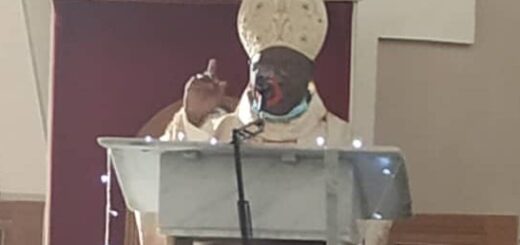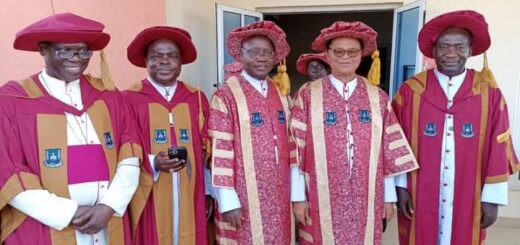Attitude of Gratitude
by ARCH BISHOP · October 9, 2022
TWENTY EIGHT SUNDAY, YEAR C, OCTOBER 9, 2022, ST. JOSEPH THE WORKER’S PARISH, KUGBO, ABUJA, HOMILY BY ARCHBISHOP I.A. KAIGAMA
READINGS: 2 Kgs. 5: 14-17; Ps. 97(98): 1-4; 2 Tim. 2: 8-13; Lk. 17: 11-19
Attitude of Gratitude
I am delighted to visit and pray with you the parish priest, Rev. Fr. Cyprian Imandeh, your close collaborators and all the members of St. Joseph the Worker’s Parish, Kugbo.
Some common words that possess the power of positive impact include: please, sorry and thank you. Today, our focus is on our ability to say “thank you” to those who do us favour or work for us: parents/guardians, husbands, wives, drivers, cooks, stewards, secretaries, gatemen, etc. It means a lot when we say “thank you” to God or “well done” to encourage one another.
The attitude of gratitude is something that Naaman, the main character in the first reading teaches us today. Naaman, the Syrian army General, was considered among the Israelites as an outcast, not only because he was a pagan, but also because he suffered from leprosy (cf. Lev. 13:1ff). Leprosy was considered a deadly disease and the patient was treated as dead already. Lepers were considered as grave sinners who suffered for their sins (cf. Num. 12:9-10, 2 Kgs. 5:27, 2 Chr. 26:19). Naaman could not find healing for his leprosy in his homeland and had to seek the Prophet Elisha in Israel as suggested by a little maid in his household (cf. 2 Kgs. 5:3).
The readings today speak about the need to express gratitude to God in moments of favour or disappointments, in difficulty or at ease. Naaman, the leprous army General received his healing after bathing seven times in the river Jordan and in gratitude, pleaded with Elisha, ‘please accept a present from your servant’ (v. 15).
In the second reading, St. Paul told Timothy that he was willing to endure suffering, even to the point of chains, as a grateful servant of Christ, that others too may be saved. Even though bound in chains, we see St. Paul being grateful to have a share in the cross of Christ. Gratitude can shift our focus from what is lacking in our lives to becoming aware of how much we have been given. Our perseverance in hardship is one of the ways of showing thanks to God for what He has bestowed on us.
The gospel reading narrates the cure of ten lepers: nine Jews and one Samaritan. While the Jews and Samaritans normally did not mix, misery brought them together. A common misfortune had broken down their racial and national barriers. The common tragedy of their leprosy forced them to see one another as people in need of help. This is what I hope our poverty, misery, insecurity, etc in Nigeria will do by binding us together and leading us to treat one another with greater respect and dignity, beyond borders or artificial barriers, so that we can make informed and wise political choices in the next elections. The lessons of the Covid-19 pandemic must not also be forgotten in a hurry where irrespective of class, race or social status, humanity was placed on the same plane, to battle for survival.
Going to show themselves to the priest (cf. Lev. 14:2), the lepers received their healing on the way, but it was the Samaritan alone who remembered to return thanks to Jesus. Many of us too suffer from amnesia. We forget favours too quickly. Remembering is an important ingredient of gratitude and is essential in our relationship with God (cf. Deut. 8:18, Neh. 4:14) as He is always mindful of us (cf. Ps. 115:12). Many times, the human mind is quick to recall past hurt and injustices more than help received. We are quick to complain than to compliment, to condemn than to commend. Many who come to God asking for solutions soon afterwards forget to return to give thanks when their request is granted. We must be grateful 24 hours a day!
In the face of so many challenges Nigerians are tempted to generalize and to have a blurred vision about national realities. We have either consciously or unconsciously been pushed into complaining so often that we tend to curse the darkness instead of lighting a candle. Yes, it is mind boggling that a public servant can commit a fraud of N109 billion; a snake swallowing N36 million, monkeys carting away most of N70 million, termites eating most of the vouchers containing details of N17 million! It is common knowledge that many Nigerian leaders steal humongous amounts of money meant for improving the lot of their people. Without compunction they steal from vulnerable people such as IDPs, HIV patients, COVID-19 victims, innocent school children, prisoners, pensioners, etc. Perhaps this is why many Nigerians have become cynical, bitter, and unable to see things positively. They see the half empty glass instead of the half full glass, where in the midst of so many social deprivations, violence, crimes, divisive tendencies and all sorts of anti-social behaviours multiply.
At least the lepers were united in suffering and faced the “greater rejection” of leprosy together. In the ugly situation of our country, in the tearful events that hit us every now and again, we must be united in seeking remedies, such as sincerely seeking the intervention of God and making very wise political choices. The seeming lack of forgiveness, love and unity makes us to have leprous dispositions. Naaman united with his household and he was heard. The ten lepers came together and were all cured. God can take away the socio-economic and political leprosy bedeviling our dear nation if we call on Him with a sincere heart, and use our ballot papers judiciously to elect leaders of compassion and sensitivity; leaders whose gratitude to Nigeria and Nigerians will not let them turn their back on the people in scandalous ingratitude.
During one of his audiences, Pope Francis said, “divide the world in two: those who do not give thanks and those who do; those who take everything as if it is owed them, and those who welcome everything as a gift, as grace.” Let us choose our leaders not from those who take everything as if it is owed them but from the ranks of those who do not take the patience and endurance of Nigerians for granted.
Among us, those who go from January to December just counting their problems and woes, and never their blessings, must ask, “How can I repay the Lord for His goodness to me?” (Ps. 116:12-13). May God heal our leprosy of ingratitude. In the words of Oliver Twist: “To say thank you is to ask for more.”
ALWAYS BE GRATEFUL!




